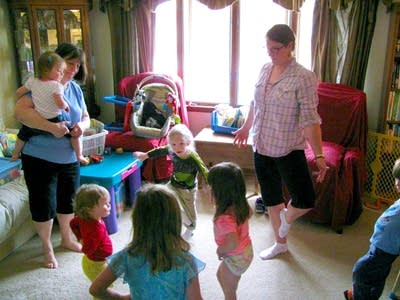Some Minn. daycare providers wary of union proposal
Go Deeper.
Create an account or log in to save stories.
Like this?
Thanks for liking this story! We have added it to a list of your favorite stories.

A proposal in the DFL-controlled Minnesota Legislature would allow daycare providers with state-subsidized clients to hold a vote to form a union.
Supporters say a union could help increase day care subsidies and give providers a unified voice at the Capitol. Critics say collective bargaining would drive up day care costs for parents.
In exchange for union dues, the American Federation of State, County and Municipal Employees (AFSCME) says daycare providers could get better continuing education and solid representation at the State Capitol.
A YEARS-LONG EFFORT
Turn Up Your Support
MPR News helps you turn down the noise and build shared understanding. Turn up your support for this public resource and keep trusted journalism accessible to all.
AFSCME Council 5 has been trying to organize Minnesota daycare providers for several years, said organizing director Eric Lehto. Providers approached the union looking for organizing help in 2005, he said.
"Child care providers in other states have organized and done a whole bunch of different things from increasing the overall child care subsidy rates," Lehto said. "It will give them opportunities for support which would professionalize their system or their profession."
Mary Albert, who runs a daycare in St. Paul, said she and some other providers have gathered as an informal union for several years. She said they've even gone to the Legislature to lobby.
Albert said they're all convinced that the clout of AFSCME would benefit them as lawmakers set subsidy rates and daycare rules.
"We just want a voice at the table when they're making rules and regulations," she said.
DOES THE UNION HAVE BIGGER PLANS?
Lehto insists the union is seeking only to organize providers like Mary Albert who have state-subsidized kids. Lehto said that the effort is not part of a larger plan to organize and collect dues from all day care providers in Minnesota.
"We are not pursuing those providers at this moment," Lehto said. "If those providers want to organize in the future, that's really up to them."

Still, many in the daycare business think the union has much broader ambitions.
Pam Reilly, who provides before and after-school daycare at her home in Oakdale, does not have any state-subsidized kids. She said AFSCME representatives have repeatedly stopped by promoting unionization and telling her that they want to start with subsidized providers but the goal is to eventually include everyone.
"That's what they told me, and then they passed out like t-shirts and stuff trying to get support," she said.
Reilly sees no value in unionizing and said union dues would be just another expense.
She's not alone.
The Minnesota Licensed Family Child Care Association said a survey it conducted in March found 86 of licensed family child care providers in Minnesota oppose the effort. The survey was sent to 8,693 providers and got a 20 percent response rate.
St. Paul child care provider Mary Ksiazek has been providing daycare for 39 years and is involved with several daycare organizations. Some are neutral on the union issue. Because of that, she speaks for herself.
She has had state-subsidized kids and could again, but she doesn't have any right now.
Ksiazek, too, is convinced AFSCME wants to represent all day care providers. She said union dues would drive up the cost of care and that she and other providers don't need a union to train them and advocate for them.
"I don't see a reason for it," she said. "We have a great system already going with family child care. We have a lot of training. The biggest thing is, I don't want them doing their talking for us."
If state lawmakers approve a unionization vote, only providers who currently have state-subsidized kids would be eligible to participate.



